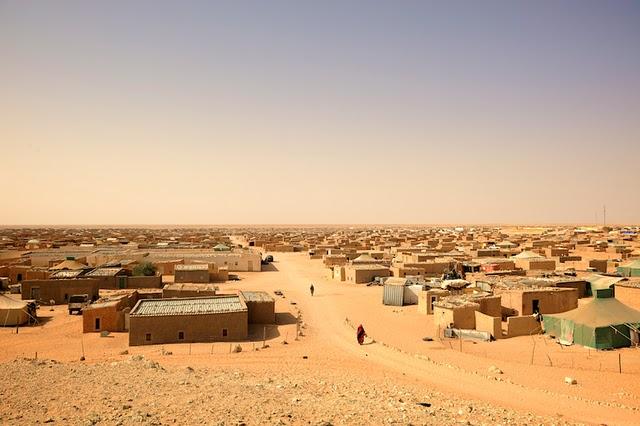The province
The Associated Press
Morocco’s government is threatening to take control of U.N.-monitored buffer zones in Western Sahara amid concerns that the mission is failing to keep out Polisario Front independence fighters.
The warning Sunday came as U.N. Security Council members received Secretary-General Antonio Guterres’ annual report on the situation in Western Sahara and the 27-year-old U.N. peacekeeping mission in the mineral-rich territory claimed by both Morocco and the Polisario.
Moroccan Foreign Minister Nasser Bourita said Sunday that the Polisario recently moved members to the U.N.-controlled areas of Bir Lehlou and Tifariti. He also said Polisario members are again entering the Guerguerat area near the Mauritanian border, despite a U.N.-brokered deal to leave after tensions erupted there in 2016.
“If the U.N., its secretary-general and the Security Council are not ready to put an end to these provocations, Morocco will have to act out its responsibility and intervene in the buffer zones,” Bourita told reporters after an emergency parliament session to address Western Sahara.
U.N. spokesman Stephane Dujarric told reporters Monday that members of the U.N. peacekeeping mission, known as MINURSO, “have not observed any movement of military elements in the northeast territory.”
“MINURSO continues to monitor the situation closely,” he added.
Interior Minister Abdelouafi Laftit said, “Morocco is ready to do everything to preserve its Sahara.”
Bourita said Morocco has alerted the Security Council to its plans to step in the deserted land, but declined to specify what kind of intervention or when it would begin.
Peru’s U.N. ambassador, Gustavo Meza-Cuadra, the current council president, told reporters Monday that he received a letter from Morocco’s U.N. ambassador that has been circulated to the 15 council members.
He called it an “informative letter” and said “no action has been taken yet.”
Morocco annexed Western Sahara, a former Spanish colony, in 1975 and fought the independence-seeking Polisario Front. The U.N. brokered a cease-fire in 1991 and established a peacekeeping mission to monitor it and to help prepare a referendum on the territory’s future that has never taken place.
The U.N. secretary-general expressed concern at escalating tensions and urged the Moroccan government and the Polisario Front to refrain from actions that could impact the cease-fire in their 42-year conflict over the Western Sahara, pointing to the escalating dispute over Guerguerat area in the buffer zone on the Morocco-Mauritanian border.
In a report to the Security Council obtained Monday by The Associated Press, Guterres called on the Polisario Front to withdraw from Guerguerat. And he urged Morocco to reconsider its refusal to send an expert mission as part of the U.N.’s effort to address questions raised by the Guerguerat situation.
“I call on both parties to exercise maximum restraint and to avoid escalating tensions, and to refrain from taking any action which may constitute a change in the status quo at the buffer strip,” Guterres said.
He said he was encouraged by steps his new personal envoy, former German President Horst Koeler, has taken to relaunch political negotiations and urged additional steps by the parties, neighbouring countries and other key players.
Kohler has sought to broaden the discussions on the territory’s future.
The Saharans’ envoy to Algeria, Abdelghafour, said Polisario members in the buffer zones are under surveillance by U.N. forces, and accused Morocco of violating the cease-fire.
“Morocco is threatening everything,” he told The Associated Press. “It’s obvious that these manoeuvrs are aimed at influencing the next U.N. Security Council meeting to stop it from taking practical, effective measures.”
Morocco considers the mineral-rich Western Sahara its southern provinces and has invested heavily in development programs, and proposed giving the territory wide-ranging autonomy. Polisario insists that the referendum can only take place based on the principle of self-determination for the local population, which it estimates at between 350,000 and 500,000.
In 2016, Moroccan forces and Polisario Front fighters moved into Guerguerat in the buffer zone but pulled out in April 2017.
Guterres said the area remained free from supporters of either side until January, when the Polisario Front established what its leaders described as a daylight-hour “monitoring post” manned by a small group of its “unarmed civilian ‘police’.” The secretary-general said the post has remained.
Also in 2016, Morocco expelled over 70 people working for the U.N. mission in Western Sahara, known as MINURSO, after then-U.N. Secretary General Ban Ki-moon used the word “occupation” in talking about Western Sahara.
Guterres recommended that the Security Council extend MINURSO’s mandate until April 30, 2019.
“The conflict over Western Sahara has lasted for too long and must be brought to an end for the dignity of the population … including those who have been displaced for more than four decades, as well as for the stability of the wider region, which is facing myriad political, economic and security challenges,” he said.
——
Associated Press writers Aomar Ouali in Algiers, Algeria, and Edith M. Lederer at the United Nations contributed to this report.







